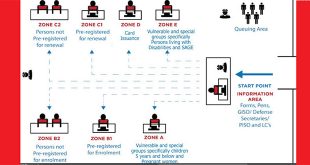Economic growth slows
Buffeted by the effects of the Covid-19 pandemic, a locust invasion and heavy rains that led to flooding, economic growth is expected to slow to between 3 to 3.3% in FY20/21 and by 2.9 to 3% in FY21/22
The fiscal deficit is expected to widen to 7.6% of GDP in Financial Year 2020/21 compared to 5.8% in Financial Year 2019/20. This is expected to worsen in Financial Year 2021 where the fiscal deficit is projected to grow between 7 and 8.9%.
The deteriorating deficit situation has been prompted by falling domestic revenues, a result of reduced economic activity, deferring of tax obligations and reduced trade, which has been coupled by an increase in spending to mitigate against Covd-19, the locust invasion and floods.
The worst hit sectors were exports, tourism, remittances from immigrant workers, Foreign Direct Investment (FDI) inflows and government project financing.
The situation has been further aggravated by demand contraction, brought about by the lockdown instituted to slow infections, which was imposed at the end of March, and restricted movement and congregation.
The ensuing closure of businesses, job cuts and reduction in incomes for most workers, has led to a collapse of consumption growth to 1% in FY2021 from an average of 6% in the last fiscal years.
It is expected that this will be balanced out by higher government spending in trying to combat the covid-19 effects, according to World Bank experts.
The current account deficit too has widened due to a faster decline in export receipts compared to the import bill, expected to be as much as $1 billion in FY20/21 and FY21/22.
Future economy
The mid-term outlook for Uganda’s economy has worsened. If Covid-19 lasts longer globally or spreads in Uganda, the World Bank says, a rapid recovery in exports, tourism and remittances from abroad will be unlikely.
This could lead to a worsening of the fiscal and external balances as well as aggravate existing social and economic challenges.
“The most vulnerable members of the society will be the hardest hit,” the Bank’s experts say, “the urban poor because restrictions on social gatherings, non-essential institution closures and transport bans, will affect services, manufacturing and construction and therefore their livelihoods.”
However, despite the widening fiscal deficit and expansion in public debt, the country is at low risk of debt distress, according to a debt sustainability analysis carried out by the World Bank and International Monetary Fund (IMF) in April.
Nonetheless, debt servicing – principal and interest payments, will account for 55% of the budget constricting the government’s liquidity and room for fiscal maneuver.
Further downside is seen with the risks of a continuation of the locust invasion, army worm infestations, new weather shocks and the uncertainty leading up to the 2021 general elections.
To get the economy quickly back on a recovery path government needs to expand it social protection mechanisms, leverage its experience in labour intensive public works to get and keep more people in work, reprioritize the budget to ensure lives and livelihoods are protected, maintain spending on goods and services which while not critical for survival are important for recovery and long term growth like education.
In addition, government needs to be more transparent and accountable in its covid-19 response. At the bare minimum, the government needs to report these expenditures separately, be open about large procurements and the winning contractors and at least a year later have an independent audit and its results be made public.
Digital space and growth
The development of the digital economy can create greater efficiencies for businesses, expand financial inclusion and provide the means to reach and aid the most vulnerable in society.
Already as a result of the rapid growth in the mobile phone sector financial inclusion grew to 50% in 2017 from 35% in 2014.
In addition, traditional businesses have used the digital space to grow markets and to create new revenue stream.
But a lot of challenges remain before Uganda can take full advantage of the digital economy such as low mobile phone coverage.
The Bank advises government to strengthen regulatory framework to allow expansion of digital economy, review taxation of digital economy to promote financial inclusion and internet access and develop a coherent strategy for supporting the digital ecosystem and catalyze regional and international integration of digital space.
Businesses like E-commerce platform Jumia Uganda have already made significant progress in supporting online transactions in line with the World Bank’s report.
Jumia Uganda CEO, Ron Kawamara told The Independent that businesses such as restaurants and others dealing in home appliances had for over the years not utilized online platforms to market and sell their goods, but this has changed in the last eight or so years.
“We have seen strong growth in digital economy with many businesses now going online,” he said adding, “More customers are choosing to buy online.”
****
 The Independent Uganda: You get the Truth we Pay the Price
The Independent Uganda: You get the Truth we Pay the Price



